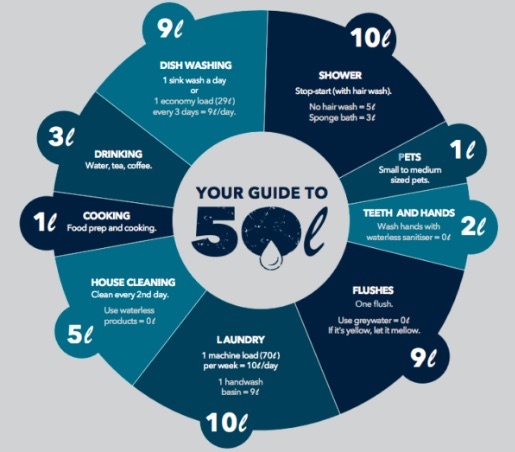Spain’s water reservoirs are 46% full rather than their usual 63%.
Making it worse, they have leaky pipes.
Water Shortages
European
In southern France, Vallon-Pont-d’Arc is a small town that has a big water problem. This past winter, for a record breaking 32 consecutive days, they had no rain at all. As a result, Vallon-Pont-d’Arc and other neighboring municipalities have banned new construction. Similarly, the July level of Italy’s River Po is 61% lower than usual because the Alps sent less water down to Europe’s main rivers. Then, making it worse, Italy could have less commercial and household water because of leaky pipes.
Germany is Europe’s only major country that does not have worrisome leaky pipes:
Cape Town
During 2018, Cape Town thought they would run out of water. (They didn’t.) A one-in-400 year drought from 2015 to 2018 was one reason. Others say they hadn’t built enough dams or created enough water storage capability in a fast-growing city. Whatever the cause, people were told to conserve.
Think of it this way. In just a typical 8.2-minute shower, we use 65 liters of water (17.2 gallons). And people in Cape Town were supposed to limit themselves to 50 liters (13 gallons) during an entire day.
Below, you can see a suggested allocation of those 50 liters:
Our Bottom Line: The Diamond Water Paradox
Adam Smith wondered why diamonds cost more than water. After all, we need water to survive while diamonds are an extravagance. Years later, economists had the answer. It took them to the margin and the cost of the next extra unit. With water, when there is a lot, the next extra glass or flush costs little. Totally though, water is priceless. With diamonds, the opposite is true. We would rather have that one extra diamond and will pay a lot for it. But the total usefulness of diamonds is small compared to water. Economists here say that we are comparing total utility to marginal utility—total usefulness to the usefulness of the next extra unit that we consume.
Now that Europe recognizes its water shortage, I suspect that an extra shower will have much more value.
My sources and more: My Economist Magazine Graphic Detail email alerted me to Europe’s leaky pipes. Then, a past econlife post had more on the Cape Town water crisis. I also suggest looking here at Montevideo, Uruguay’s current water crisis. Meanwhile, if you want more on water, diamonds, and the paradox of value, econlib is always a handy destination. And finally, this Brookings paper explains what saved Cape Town.
Please note that several of today’s sentences were in a past econlife post.








